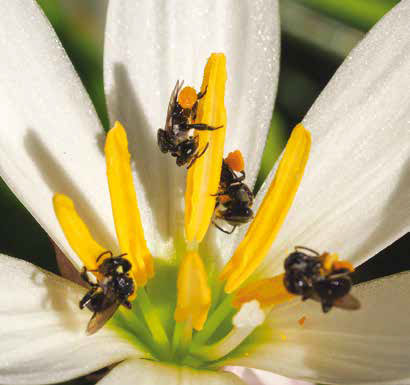By SUNAYANA SAJITH PhD Candidate, Hawkesbury Institute for the Environment, Western Sydney University. Reviewed by PROFESSOR JAMES COOK and ASSOCIATE PROFESSOR ROBERT SPOONER-HART
About The Project
“Stingless bees as effective managed pollinators for Australian horticulture”
is funded by the Hort Frontiers Pollination Fund, part of the Hort Frontiers strategic partnership initiative developed by Hort Innovation, with co-investment from Western Sydney University, Bayer CropScience, Syngenta Asia-Pacific and Greening Australia, and contributions from the Australian Government.
The Pollination Team at Western Sydney University (WSU) is researching the potential of native stingless bees as managed pollinators for protected cropping environments.
Pollination is a key issue for many crops grown under protected conditions and our work aims to benefit growers by improving the delivery and resilience of pollination services.
Growers can help us with these aims by participating in our project through short surveys detailed over the next page.

Above: Stingless bee foraging on Lily. Photo: James Cook
Stingless Bee Research Aims
Stingless bees are currently the only alternative to honey bees if you seek a managed hive with thousands of insects per hive.
And they don’t sting, which overcomes OH&S problems!
WSU research aims to address key topics, such as:
What are current crop management practices for pollination, and other issues relevant to bees, including IPDM and use of biological control?
How effective are stingless bees at pollinating particular crops
How can we best manage and deploy stingless bees in glasshouses?
Is managed stingless bee pollination an economic option for glasshouse growers, and if so in which crops?
Our researchers will first collect data from growers and stingless beekeepers on the current use and management of stingless bees for crop pollination, as well as Integrated Pest and Disease Management (IDPM) practices in Australia and India.
This information will provide valuable baseline data for researchers who are conducting experimental studies to investigate the effectiveness of stingless bees as alternative, managed pollinators.
The use of enclosures can provide excellent conditions for plant growth, but we know much less about how nets, polytunnels and glasshouses affect the biology and behaviour of insect pollinators.
For example, changes in light quality, as well as a simplified “landscape”, may alter bee navigation and foraging behaviour and this could limit pollination of the crop.
Life in a glasshouse with a single crop may also influence bee health and nutrition, and we need to manage this to have healthy happy and hard-working bees!
Our research will help identify best practices for deployment of pollinators in protected cropping, with a current major focus on stingless bees in glasshouses.
We will assess how effective stingless bees are at pollinating a range of crop species, and also investigate how we can optimise the husbandry and deployment of bees in glasshouses to keep them happy and get the best services from them.
ALTERNATIVE POLLINATORS
In addition to our current major focus on stingless bees in glasshouses, we also plan to investigate the use of flies and possibly other bee species as glasshouse pollinators, as well as the performance of honeybees and native insects under polytunnels and under nets.
PARTICIPATE
If you are a grower interested in the stingless bee project and would like to participate in our research we would greatly appreciate you spending 10 minutes of your valuable time filling out an online survey:
www.surveymonkey.com/r/MK8HJWR
There is also a survey for stingless beekeepers at
www.surveymonkey.com/r/9FKZ3MV
More Information
Jasmine Grinyer, Project Manager J.Grinyer@westernsydney.edu.au
